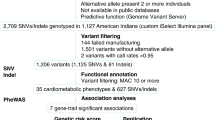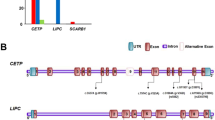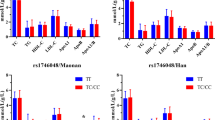Abstract
Obesity and diabetes are serious health problems for Americans and especially for those with American Indian or Mexican ancestry. A preliminary survey by protein analysis rather than classical nucleic acid sequencing methods has suggested a correlation between a newly discovered T45S variant of apolipoprotein C1 (ApoC1), found only in persons with American Indian or Mexican ancestry, and elevated body mass index (BMI). American Indians with the S45 ApoC1 variant (n=36) had an average of 9% higher BMI than those who had only T45 ApoC1 (n=192, P=0.029). Elevated rates of diabetes were reported for parents of subjects with the S45 protein (P=0.006). In five gender-matched sibling pairs, persons with Mexican ancestry showed a 1.34-fold higher BMI for those with S45 ApoC1 (P=0.022). This protein may contribute to the elevated rates of diabetes in relevant ethnic groups and might be more common in isolated populations.
This is a preview of subscription content, access via your institution
Access options
Subscribe to this journal
Receive 12 print issues and online access
$259.00 per year
only $21.58 per issue
Buy this article
- Purchase on Springer Link
- Instant access to full article PDF
Prices may be subject to local taxes which are calculated during checkout

Similar content being viewed by others
References
Conde-Knape K, Bensadoun A, Sobel JH, Cohn JS, Shachter NS . Overexpression of apoC-I in apoE-null mice: severe hypertriglyceridemia due to inhibition of hepatic lipase. J Lipid Res (2002); 43: 2136–2145.
Berbee JF, van der Hoogt CC, Sundararaman D, Havekes LM, Rensen PC . Severe hypertriglyceridemia in human APOC1 transgenic mice is caused by apoC-I-induced inhibition of LPL. J Lipid Res (2005); 46: 297–306.
Poensgen J . Apolipoprotein C-1 inhibits the hydrolysis by phospholipase A2 of phospholipids in liposomes and cell membranes. Biochim Biophys Acta (1990); 1042: 188–192.
Gautier T, Masson D, de Barros JP, Athias A, Gambert P, Aunis D et al. Human apolipoprotein C-I accounts for the ability of plasma high density lipoproteins to inhibit the cholesteryl ester transfer protein activity. J Biol Chem (2000); 275: 37504–37509.
Kushwaha RS, Hasan SQ, McGill Jr HC, Getz GS, Dunham RG, Kanda P . Characterization of cholesteryl ester transfer protein inhibitor from plasma of baboons (Papio sp.). J Lipid Res (1993); 34: 1285–1297.
Weisgraber KH, Mahley RW, Kowal RC, Herz J, Goldstein JL, Brown MS . Apolipoprotein C-I modulates the interaction of apolipoprotein E with beta-migrating very low density lipoproteins (beta-VLDL) and inhibits binding of beta-VLDL to low density lipoprotein receptor-related protein. J Biol Chem (1990); 265: 22453–22459.
Liu M, Subbaiah PV . Activation of plasma lysolecithin acyltransferase reaction by apolipoproteins A-I, C-I and E. Biochim Biophys Acta (1993); 1168: 144–152.
Cohn JS, Tremblay M, Boulet L, Jacques H, Davignon J, Roy M et al. Plasma concentration and lipoprotein distribution of ApoC-I is dependent on ApoE genotype rather than the Hpa I ApoC-I promoter polymorphism. Atherosclerosis (2003); 169: 63–70.
Shachter NS, Rabinowitz D, Stohl S, Conde-Knape K, Cohn JS, Deckelbaum RJ et al. The common insertional polymorphism in the APOC1 promoter is associated with serum apolipoprotein C-I levels in Hispanic children. Atherosclerosis (2005); 179: 387–393.
Gao L, Gabriel C, Lavoie T, Ye SQ . An improved RSP method to detect HpaI polymorphism in the apolipoprotein C-1 gene promoter. BMC Med Genet (2002); 3: 13.
Shi J, Zhang S, Ma C, Liu X, Li T, Tang M et al. Association between apolipoprotein CI HpaI polymorphism and sporadic Alzheimer's disease in Chinese. Acta Neurol Scand (2004); 109: 140–145.
Retz W, Thome J, Durany N, Harsanyi A, Retz-Junginger P, Kornhuber J et al. Potential genetic markers of sporadic Alzheimer's dementia. Psychiatr Genet (2001); 11: 115–122.
Muurling M, van den Hoek AM, Mensink RP, Pijl H, Romijn JA, Havekes LM et al. Overexpression of APOC1 in obob mice leads to hepatic steatosis and severe hepatic insulin resistance. J Lipid Res (2004); 45: 9–16.
Wroblewski MS, Wilson-Grady JT, Martinez MB, Kasthuri RS, McMillan KR, Flood-Urdangarin C et al. A functional polymorphism of apolipoprotein C1 detected by mass spectrometry. FEBS J (2006); 273: 4107–4115.
Nelsestuen GL, Zhang Y, Martinez MB, Key NS, Jilma B, Verneris M et al. Plasma protein profiling: unique and stable features of the plasma proteome. Proteomics (2005); 5: 4012–4024.
Acknowledgements
This work was supported in part by the endowment to the Samuel Kirkwood professorship (GLN). RSK was supported by a National Hemophilia Clinical Fellowship Award. KM is a Bush Medical Fellow (Bush Foundation). We thank the expert technical assistance of Ms Julia Nguyen and other volunteers who assisted in sample procurement.
Author information
Authors and Affiliations
Corresponding author
Rights and permissions
About this article
Cite this article
Kasthuri, R., McMillan, K., Flood-Urdangarin, C. et al. Correlation of a T45S variant of apolipoprotein C1 with elevated BMI in persons of American Indian and Mexican ancestries. Int J Obes 31, 1334–1336 (2007). https://doi.org/10.1038/sj.ijo.0803569
Received:
Revised:
Accepted:
Published:
Issue Date:
DOI: https://doi.org/10.1038/sj.ijo.0803569
Keywords
This article is cited by
-
Sitagliptin Results in a Decrease of Truncated Apolipoprotein C1
Diabetes Therapy (2015)
-
Proteogenomic review of the changes in primate apoC-I during evolution
Frontiers in Biology (2013)



